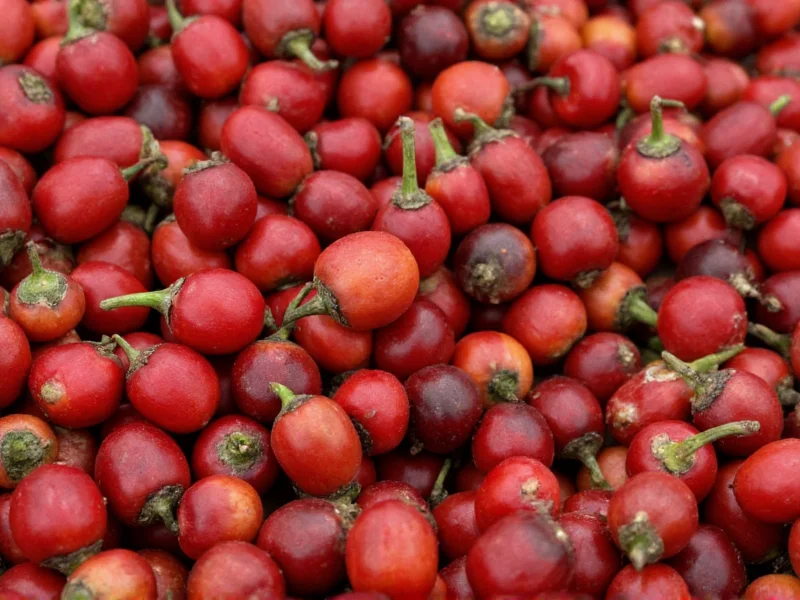Understanding whether peppercorn is a fruit or vegetable requires examining both botanical science and culinary traditions. While kitchen contexts often categorize peppercorns simply as “spices,” their biological classification tells a different story. This distinction matters for gardeners, cooks, and food science enthusiasts who want accurate information about what they’re growing or consuming.
Botanical Classification: Why Peppercorns Are Fruits
In botanical terms, a fruit develops from the ovary of a flowering plant and typically contains seeds. Peppercorns perfectly fit this definition. They form as small, round drupes (a type of berry) on the Piper nigrum vine. Each peppercorn begins as a flower that, once pollinated, develops into a fruit containing a single seed.
The confusion arises because we don’t consume peppercorns in their fresh, ripe state like typical fruits. Instead, they’re harvested and processed differently depending on the variety:
| Peppercorn Type | Harvest Stage | Processing Method | Botanical Status |
|---|---|---|---|
| Black Peppercorn | Half-ripe | Sun-dried until wrinkled and dark | Fruit (berry) |
| White Peppercorn | Fully ripe | Soaked to remove outer fruit layer | Seed of the fruit |
| Green Peppercorn | Unripe | Preserved or freeze-dried | Fruit (berry) |
| Red Peppercorn | Fully ripe | Preserved in brine or vinegar | Fruit (berry) |
Culinary vs. Botanical Classification
The question “is peppercorn a fruit or vegetable” highlights the difference between scientific classification and culinary usage. In cooking, peppercorns are universally treated as spices, not fruits or vegetables. This culinary categorization focuses on flavor profile and usage rather than biological origin.
Vegetables, botanically speaking, refer to edible plant parts like roots, stems, or leaves. Since peppercorns develop from flowers and contain seeds, they don’t qualify as vegetables under any botanical definition. The common confusion stems from:
- Peppercorns being dried and used as seasoning rather than eaten fresh
- Many spices coming from various plant parts (seeds, bark, roots)
- Lack of sweetness typically associated with fruits
Peppercorns in the Context of Other “Spice Fruits”
Peppercorns aren’t alone in this classification paradox. Several other common “spices” are botanically fruits:
- Allspice - Berries from the Pimenta dioica tree
- Vanilla - Seed pods from an orchid
- Nutmeg - Seeds from the Myristica fragrans fruit
- Cardamom - Seeds contained within pods
Like peppercorns, these are all fruits or seeds of fruits that have been dried and processed for culinary use. Understanding this helps clarify why the question “is black peppercorn a fruit” has a definitive botanical answer despite culinary conventions.
Nutritional Profile of Peppercorns as Fruits
As fruits, peppercorns contain certain nutritional components typical of plant fruits, though in concentrated forms due to drying:
- Piperine - The compound responsible for pepper’s heat and many health benefits
- Vitamin K - Important for blood clotting and bone health
- Manganese - Essential mineral for metabolism and bone formation
- Antioxidants - Various compounds that combat oxidative stress
These nutritional elements exist because peppercorns are fruits—the plant’s mechanism for seed dispersal and protection. The concentration of these compounds explains why such a small “fruit” delivers such potent flavor and potential health benefits.
Common Misconceptions About Peppercorn Classification
Several misconceptions contribute to the confusion about whether peppercorn is a fruit or vegetable:
- “Since it’s not sweet, it can’t be a fruit” - Many fruits aren’t sweet (cucumbers, tomatoes, peppers)
- “Spices can’t be fruits” - Spices can come from any plant part, including fruits
- “Vegetables are savory plant foods” - Culinary “vegetables” aren’t a botanical category
Understanding these distinctions helps answer related queries like “why is peppercorn considered a fruit” or “is black pepper a fruit botanically.” The key is recognizing that botanical classification follows scientific principles, while culinary terms serve practical cooking purposes.
Practical Implications for Gardeners and Cooks
For home gardeners interested in growing peppercorns, understanding their fruit status is essential. Piper nigrum is a tropical vine that produces fruit clusters only under specific conditions. It requires:
- Warm temperatures (75-85°F / 24-29°C)
- High humidity
- Partial shade
- Support structure for climbing
Cooks benefit from this knowledge when selecting peppercorns. Since they’re fruits, freshness matters—whole peppercorns retain flavor longer than pre-ground pepper because the fruit’s protective layers preserve the volatile compounds. This explains why culinary professionals consistently recommend grinding peppercorns fresh rather than using pre-ground pepper.











 浙公网安备
33010002000092号
浙公网安备
33010002000092号 浙B2-20120091-4
浙B2-20120091-4